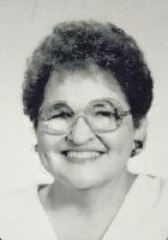Delia Villegas Vorhauer facts for kids
Delia Villegas Vorhauer (born April 17, 1940 – died June 1, 1992) was an American Latina social worker. She helped many Hispanic communities in Illinois, Ohio, and Michigan. Delia was given a special medal by the President for her important work.
She started a group called Mujeres Unidas de Michigan. This group helped women who spoke Spanish. Because of their hard work, six women from the group went to a big meeting called the 1977 National Women's Conference. This meeting was part of the United Nations' International Women's Year programs. Delia was a leader for the group at this conference.
Delia also wrote a report called the Mason Miller Report. This report looked at how minority students were doing in colleges. It became a guide for other schools in Michigan. Her work helped create a law in Michigan for teaching in two languages (bi-lingual education). Later in her life, Delia lost her sight because of diabetes. She then became a strong supporter for people who are blind. In 1990, she was honored in the Michigan Women's Hall of Fame. She was the first Latina woman to receive this honor.
Delia's Early Life
Delia Villegas was born on April 17, 1940, in El Paso, Texas. Her parents were Consuelo and Bernardo Villegas. Her father and grandfather were both eye doctors (optometrists). Delia and her two older brothers, along with their adopted sister Rebecca, grew up following their Mexican heritage.
Delia went to a Catholic school in Juarez, Mexico. When she was thirteen, she read her father's medical books. She realized she might have diabetes, and a doctor later confirmed it. Delia went to El Paso High School. She was the editor of the school newspaper, The Tatler. After high school, Delia moved to Chicago in 1958. She went to Rosary College in River Forest, Illinois. In 1962, she earned a degree in sociology, which is the study of how people live in groups.
Delia's Career and Activism
After college, Delia became a social worker in Chicago. She helped with adoptions and child protection. She also wrote a weekly column called Servicio Social for a local Spanish newspaper. In 1964, a program called the Manpower Development and Training Act (MDTA) started helping people who didn't speak English. Delia was hired to lead this program in Chicago.
Her team offered job training and English lessons. They also gave advice on family and money matters. Special programs helped Puerto Rican people in Chicago learn English. In 1967, Delia was one of only five women asked to speak to President Lyndon B. Johnson's committee. She talked about issues affecting Hispanic communities in the U.S. That same year, she received a presidential medal. Her MDTA program was the most successful in the country.
On June 22, 1968, Delia married William Federico Vorhauer. They moved to Cambridge, Massachusetts. Delia worked as the director of Hispanic Affairs for Boston's Community Development office. She helped open a special school for young people in the city. She also organized the first city-wide meeting about Puerto Rican issues.
The next year, Delia and William moved to Bowling Green, Ohio. Delia worked for the Ohio Bureau of Employment Services. She helped migrant workers with moving and finding new homes. In 1972, she went back to school to get her master's degree. She also directed the Mexican-American Project at Bowling Green State University. After finishing her master's in sociology in 1974, she moved to Lansing, Michigan. She became a higher education consultant for the Michigan Department of Education.
In 1975, Delia went to a meeting for Latina women. She then started Mujeres Unidas de Michigan (MUM), which means "United Women of Michigan." This group supported women, and Delia became its leader in 1978. That same year, the Governor of Michigan, William Milliken, asked her to join the Michigan Women's Commission. She helped plan for the United Nations' International Women's Year program. She was also a vice-leader for Michigan's group at the national conference.
MUM worked to help Latina women become leaders. Six members from MUM joined the Michigan group of 48 women. They all went to the 1977 National Women's Conference in Houston, Texas. In 1976, Delia wrote the Mason Miller Report. This report studied how minority students were doing in colleges. It became a guide for other colleges in Michigan. The report helped create a new law in Michigan in 1978 for teaching in two languages. Because of her work, Delia was featured in Redbook magazine in March 1978. They called her one of eleven women "Making It Happen."
By this time, Delia had lost most of her sight due to diabetes. In 1980, she had surgery to try and get some vision back, but it did not work. She still returned to work at Michigan Rehabilitation Services. This organization helps people with disabilities become independent. Delia traveled around the state, setting up offices to help people. In 1988, she had to retire because of kidney failure and needed dialysis.
However, within a year, she was back at work. She became the leader of the Michigan Commission for the Blind. She was the first Hispanic person to hold this job. She started a newspaper with large print for people with low vision. She also created a group for blind Catholics to attend church together. In 1990, Delia was honored in the Michigan Women's Hall of Fame. She was the first Latina woman to be recognized there. Soon after, she retired and moved to Las Cruces, New Mexico, to be near her brother.
Delia's Legacy
Delia Villegas Vorhauer passed away on June 1, 1992, in Las Cruces, New Mexico. The group she founded, Mujeres Unidas de Michigan, inspired another group of Latina women. This new group, Hispanic Women's in the Network, worked to help younger Latina women. Delia's work continues to help many people.
 | Leon Lynch |
 | Milton P. Webster |
 | Ferdinand Smith |


